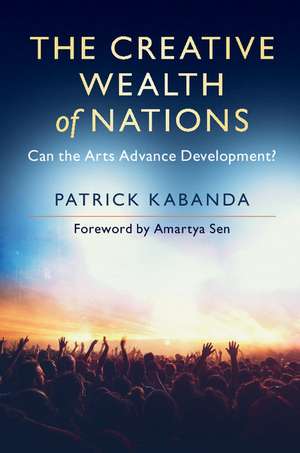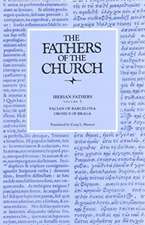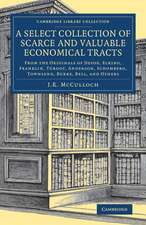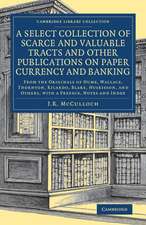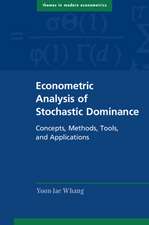The Creative Wealth of Nations: Can the Arts Advance Development?
Autor Patrick Kabanda Cuvânt înainte de Amartya Senen Limba Engleză Hardback – 16 mai 2018
| Toate formatele și edițiile | Preț | Express |
|---|---|---|
| Paperback (1) | 288.80 lei 6-8 săpt. | |
| Cambridge University Press – 16 mai 2018 | 288.80 lei 6-8 săpt. | |
| Hardback (1) | 815.21 lei 6-8 săpt. | |
| Cambridge University Press – 16 mai 2018 | 815.21 lei 6-8 săpt. |
Preț: 815.21 lei
Preț vechi: 815.21 lei
-NaN% Nou
Puncte Express: 1223
Preț estimativ în valută:
156.03€ • 162.28$ • 130.75£
156.03€ • 162.28$ • 130.75£
Carte tipărită la comandă
Livrare economică 13-27 martie
Preluare comenzi: 021 569.72.76
Specificații
ISBN-13: 9781108423571
ISBN-10: 1108423574
Pagini: 346
Ilustrații: 5 b/w illus. 10 tables
Dimensiuni: 21 x 235 x 157 mm
Greutate: 0.61 kg
Editura: Cambridge University Press
Colecția Cambridge University Press
Locul publicării:Cambridge, United Kingdom
ISBN-10: 1108423574
Pagini: 346
Ilustrații: 5 b/w illus. 10 tables
Dimensiuni: 21 x 235 x 157 mm
Greutate: 0.61 kg
Editura: Cambridge University Press
Colecția Cambridge University Press
Locul publicării:Cambridge, United Kingdom
Cuprins
Foreword Amartya Sen; Prelude; Acknowledgements; Overture: from sustainable to meaningful development: the role of the arts; Part I. The Arts, The Economy, and Development: 1. An untapped and unmeasured economy: on the value of the arts; 2. Arts in education: cultivating creative minds for development; 3. The arts and environmental stewardship; Part II. Trade in Services: A Three-Part Suite: 4. International trade in cultural services; 5. Artists without borders in the digital age; 6. On cultural tourism; Part III. Variations on a Theme: 7. The unsettled question of women in the performing arts; 8. The arts in mental health, social healing, and urban renewal; Part IV. Rondo: A Round-Up of Data; 9. Creative data collection; Finale:on imagination and choice; Annexes; Notes; Glossary of selected musical terms; References; Index.
Recenzii
'Creativity and imagination go together. One leads to the other. Kabanda hits the very central point of human progress, the creativity and how it relates to development. Without inspiration for imagination the world is a dead place. Kabanda presented in a very convincing way the role of creative industry and arts in the broad framework of development discourse. Anybody interested in development must read it. It gives a completely new perspective.' Muhammad Yunus, Nobel Peace Prize Laureate, 2006
'The Creative Wealth of Nations very originally calls our attention to the role of the arts and intellectual progress in increasing economic growth. It is marked by an interesting combination of surveying research and anecdote and will be very persuasive in introducing a new element of policy.' Kenneth J. Arrow, Nobel Laureate in Economics, 1972
'All individuals and all communities live by the stories they tell and by the music they produce. The Creative Wealth of Nations opens up a new field in economic development by showing the importance of the arts, in people's economic and social lives. As a dividend to the reader, this superbly written book is itself a work of art: with every page filled with fascinating observations and facts.' George Akerlof, Nobel Laureate in Economics, 2001
'This is an important book which shows how the arts can nurture creativity and promote economic growth and development. Patrick Kabanda grew up in Uganda, amidst the strange duality of the sound of music at home, and political conflict outside, casting shadow on a child's life. When Kabanda, a talented musician and composer with interest in economic development, came to the World Bank to work with me I was curious about what he would contribute. Among his other work during this period, was this book. It draws on his early experience and later research, and is a must read whether you are interested in art and arias, or growth rates and gross incomes.' Kaushik Basu, Cornell University
'The distinctive feature of Patrick Kabanda's book is that it brings together his knowledge of the arts, as a practitioner of music, with his experience and training in international affairs. He adds his understanding of Africa to his observations and experience of growth in developed countries. With his unique background, he points out the varying qualities and levels of development of the multitude of people in such places as Africa and how they might be joined to global business initiatives and development priorities. The result is a distinctly African approach to development across the world, especially on the continent that will one day play a major role in global business and social development.' Sir James Wolfensohn, KBE AO, former President of the World Bank (1995–2005)
'The distinguishing feature of this book is that while other studies have been concerned mainly with general principles and broad evidence, Kabanda starts from an intensely personal experience as a musician who grew up in a poor suburb in Uganda and blends the insights gleaned from that experience with broader considerations. This blending of the personal with the general brings a distinctive flavour of passion and authenticity to the book that renders the experience of reading it highly enjoyable and richly rewarding at the same time.' S. R. Osmani, Journal of Human Development and Capability
'The Creative Wealth of Nations very originally calls our attention to the role of the arts and intellectual progress in increasing economic growth. It is marked by an interesting combination of surveying research and anecdote and will be very persuasive in introducing a new element of policy.' Kenneth J. Arrow, Nobel Laureate in Economics, 1972
'All individuals and all communities live by the stories they tell and by the music they produce. The Creative Wealth of Nations opens up a new field in economic development by showing the importance of the arts, in people's economic and social lives. As a dividend to the reader, this superbly written book is itself a work of art: with every page filled with fascinating observations and facts.' George Akerlof, Nobel Laureate in Economics, 2001
'This is an important book which shows how the arts can nurture creativity and promote economic growth and development. Patrick Kabanda grew up in Uganda, amidst the strange duality of the sound of music at home, and political conflict outside, casting shadow on a child's life. When Kabanda, a talented musician and composer with interest in economic development, came to the World Bank to work with me I was curious about what he would contribute. Among his other work during this period, was this book. It draws on his early experience and later research, and is a must read whether you are interested in art and arias, or growth rates and gross incomes.' Kaushik Basu, Cornell University
'The distinctive feature of Patrick Kabanda's book is that it brings together his knowledge of the arts, as a practitioner of music, with his experience and training in international affairs. He adds his understanding of Africa to his observations and experience of growth in developed countries. With his unique background, he points out the varying qualities and levels of development of the multitude of people in such places as Africa and how they might be joined to global business initiatives and development priorities. The result is a distinctly African approach to development across the world, especially on the continent that will one day play a major role in global business and social development.' Sir James Wolfensohn, KBE AO, former President of the World Bank (1995–2005)
'The distinguishing feature of this book is that while other studies have been concerned mainly with general principles and broad evidence, Kabanda starts from an intensely personal experience as a musician who grew up in a poor suburb in Uganda and blends the insights gleaned from that experience with broader considerations. This blending of the personal with the general brings a distinctive flavour of passion and authenticity to the book that renders the experience of reading it highly enjoyable and richly rewarding at the same time.' S. R. Osmani, Journal of Human Development and Capability
Notă biografică
Descriere
Demonstrates how we can, and why we should, apply the arts in development to promote meaningful economic and social progress.
